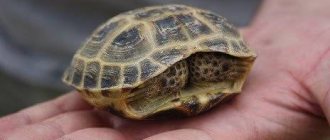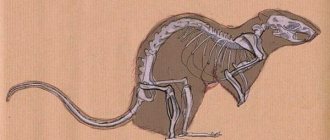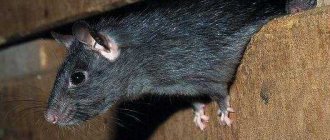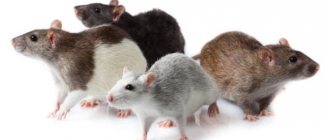Rats make wonderful pets: they are smart, sociable, clean, independent, loyal and affectionate. All these qualities make them take root in our hearts and become beloved family members.
Today we're going to look at the sadder side of pet rat ownership. Unfortunately, one of the disadvantages of keeping pet rats is their susceptibility to disease. Their lifespan is also quite short - usually only two to three years. Therefore, all owners of these rodents should know the symptoms of fatal rat diseases.
What causes pet rats to die?
The average lifespan of rats is 1-3 years, with domestic (decorative) rats living longer - up to 3 years, while wild ones - less than 1 year. It would seem that such animals should be hardy, able to survive, which is facilitated by their small size. But various factors shorten lifespan, and there are a large number of causes of death in domestic rats. This makes such animals fragile, very susceptible to negative factors, including:
1 diseases: animals can die from complications after respiratory diseases, oncology, infections, heart problems are not alien to them, for example, a heart attack or stroke can occur; by external signs it is usually difficult for the average person to determine what caused the death of a pet, therefore, with the slightest changes in behavior, you should contact a veterinarian, but most diseases cannot be treated;
2 frequent pregnancies, childbirth: given the short life expectancy, it is quite normal that the body of domestic rats can reproduce offspring at a high speed, and the interval between birth and conception is only 2-3 hours; after the end of the specified period, pregnancy may occur again, so it is important to keep males and females in separate cells, the interval between birth and the next conception should be maintained at least 3 months, otherwise the body will quickly wear out, which will hasten death;
3 injuries: most often the animal gets hit when it finds itself outside the cage (a person accidentally steps on it, gets caught by a cat, a rat falls from a great height, etc.), and the probability of injury is very high, which can lead to the death of the animal, there is also a risk the appearance of wounds during a fight with relatives;
4 poisoning: a rat in the wild can gnaw on various things, plants, there is a risk of death if the substance poses a danger to a living organism, for example, among plants, some are especially distinguished (rhododendron, cyclamen, dieffenbachia), and the owner may not even notice signs of intoxication if a large amount of a toxic substance has entered the body;
5 poor maintenance: poor living conditions, poor quality of care for the pet contribute to the development of diseases, the pet cannot make it clear that something needs to be changed, so the owners must be more careful, the bedding should be changed regularly, dangerous objects and substances should be removed from the cage and room, keep the sippy cup clean, change the water regularly, control the quality of food.
In order for a rat to live longer, you should buy a baby animal from parents who are not relatives, otherwise the life expectancy will be no more than 1.5 years.
The impact of nutrition on health
The rat's diet must be balanced and extremely healthy. The food you eat yourself may not be suitable for your pet. This is especially true for fried, spicy, fatty, and sweet foods. Do not give domestic rodents anything that they would never obtain in the wild.
Any deviation from the normal diet entails liver problems, obesity of internal organs, kidney dysfunction and rapid weight gain. Accordingly, the already short lifespan of domestic rats is halved.
Did you know? Rat teeth are so strong that they easily crush concrete and certain metal alloys. Their teeth grow without slowing down throughout their lives, so rats are forced to constantly grind them down on something.
What can you feed rats:
- Nuts and grains. Nuts contain the protein rodents need, although you should limit yourself to walnuts and give them one a day. Cereals are a reliable source of carbohydrates, and sprouted grains contain important vitamin E, which strengthens the immunity of warm-blooded creatures. Any grains other than wheat are suitable for rats - buckwheat, rice, rye, oats.
- Vegetables, fruits, berries, herbs. They form the basis of the diet of rodents - you can feed them with the products that are grown in your region. No tropical fruits or imported arugula. It is better to give vegetables boiled, and large seeds will have to be removed from fruits and berries first. In winter, diversify your pet's diet with fresh frozen berries, having previously defrosted them. In the summer, you can use dandelion leaves and stems as greenery; your pet will eat them with pleasure.
- Dried fruits. The rat will eat everything - prunes, dried apricots, dried pears and apples. Dried berries will also benefit her.
- Meat and fish.
There is an opinion that rats should not be given meat products. This is not true - rodents eat meat, but rarely, so you can feed them boiled (in no case fried or raw) fish and meat on weekends. Feeding eggs should be the same - hard-boiled, in small portions once a week. You cannot feed a rat milk, but fermented milk cheese will improve its intestinal microflora and provide it with the necessary calcium. - Mineral supplements. This includes chalk, calcined tablets, and ordinary charcoal. Make sure that your pet’s diet is balanced in vitamins - buy him vitamin complexes for rodents.
What not to give to rats:
Raw foods. This includes all vegetables except carrots, and meat, raw and fried.
Pay special attention to fatty meats such as pork. You can't feed it even boiled
Milk and carbonated drinks
Milk can cause volvulus in your pet, and carbonated drinks are not even beneficial for humans.
Vegetables and fruits are green. Exclude apples, cucumbers, sweet peppers, zucchini, and unripe bananas from your pet’s diet.
Sweet, spicy, salty. What is acceptable for humans is prohibited for rodents. From too active food, they develop problems with the gastrointestinal tract and exhibit allergic reactions.
Important! The immunity of ornamental rodents, originally bred for laboratory tests, is much weaker than that of their gray wild relatives, who do not mind drafts, sunlight and stale scraps. You need to be prepared for the fact that your pet will reach the peak of its development by one and a half years, and will die of old age at two and a half years, if it does not become a victim of some infectious disease before this time.
How to tell if a rat is dying of old age
When mice or rats reach their last days, you need to carefully monitor their condition. Old animals are even more demanding of care. Their behavior, as well as their appearance, changes:
- external signs: you need to start worrying when the fur loses its shine, sticks out in different directions, does not lie flat, the shine in the eyes also disappears, they become lifeless, there is also a loss of body weight, the animal seems more elongated;
- behavior of decorative rats before death: in some cases, the disease develops rapidly, the pet owner does not have time to notice the changes, in other cases, a gradual withering of the animal can be noted, the rat begins to drag its hind legs, cannot climb to the upper tiers of the cage, the pet is disoriented, loses fur, stops take care of the fur, when there is a cold, porphyrin is released when sneezing, the pet tries to close its eyes, tries to lie down more.
The rat is inhibited, stops responding to external stimuli and its name, and movements may become slower.
Nervous system diseases
Contrary to opinions, rats are also susceptible to various diseases.
The situation with stable stress and poor nutrition is typical for them as well as for humans. If an ornamental rodent has crossed the two-year mark, then it has a high chance of developing diseases such as arthritis of the paws, tumors, respiratory problems, and stroke. The symptoms of a stroke in a rat are dangerous because they occur suddenly and develop quickly, and can end in paralysis of the limbs, convulsions and death. We will take a closer look at this disease, its symptoms and treatment.
How to care for an animal that is about to die
Life expectancy increases if more careful care is provided. This is especially important for older animals. Towards the end of its life, the mouse will behave calmer, this will help conserve energy, thereby increasing its lifespan. Recommendations to help avoid losing your pet in the near future:
- it is important not only to provide careful care, but also to let the rat feel love, care, you should stroke the animal more often, talk to it, pick it up, this may seem unimportant, but the animal, like any living creature, needs affection, care, this will allow the pet to leave peacefully;
- you should regularly put the cage in order: remove excrement, completely change the filler, and it is advisable to leave scraps of toilet paper in the tray instead of sawdust, it is difficult for an elderly rat to maintain hygiene, in addition, the soft filler is more pleasant, but it needs to be changed daily, otherwise there will be an odor, quality wool will deteriorate;
- an elderly rat does not strive to climb to the upper tiers of the cage, it is weakened, has less energy, this does not allow it to be active, so lifting elements (ladders, bridges and ropes) should be dismantled;
- if the rat is already about to die (weakened), you need to spend more time near it in order to bring it to food and water, since the pet is no longer able to cover even short distances.
A rat in its old age needs rest, so it should not be shared with other, especially younger animals. The old pet must be placed in a separate cage.
“Rat Death”: pros and cons, assessment of the effectiveness of the drug
The appearance of rats in the house is not only unpleasant, but also very dangerous. Therefore, when you notice the first pest, immediately start a war. “Rat Death” is recognized as an effective remedy. The drug is easy to use and ensures rapid death of tailed animals. And the instructions for using “Rat Death” will help you become familiar with the technology for exterminating rodents.
Rodents, moving around the apartment, spoil food, contaminate surfaces with their excrement, and can chew not only furniture, but also electrical wiring, which often leads to fires. But the greatest harm of tailed animals lies in their ability to endure extremely serious diseases, such as plague, hemorrhagic fever, leptospirosis, and rabies. Therefore, you should not hesitate to exterminate rats, because you are putting yourself and your family at serious risk.
What to do after the death of a pet
If the owner and the rat have a strong emotional connection, you should try to spend the last hours together. But the animal will die sooner or later, it is important to understand what to do in this case. First of all, you should understand the question of where and how to bury the animal. Legislation limits options for burying animal remains. This is due to the fact that when biological tissues that may be contaminated with infection enter the soil, the risk of the spread of pathogenic microflora increases. In addition, animals can find and destroy the burial site.
How to bury
If previously there were few burial methods, now there are many more. What to do after the death of a rat:
- contact the city veterinary service and clarify how the procedure will be carried out; in this case, the remains of the animal are cremated; if there is no crematorium oven, the doctor can refer you to a third-party facility;
- burial in a special cemetery - for pets, but not all cities have them, transporting a small rat over long distances is impractical, funeral costs will be significant, it is rare that an owner will decide to spend a lot of money for the burial of his rat friend;
- burial outside the city in a free area, in your dacha, backyard, but this will have to be done hidden, because if a neighbor sees the burial of the remains on a plot in a private house, he can file a complaint with the appropriate authorities, this method has another drawback – a constant reminder of the death of your beloved rat, which will not allow the wounds to heal for a long time.
When burying a rat in the ground, you must adhere to the rules - the size of the hole must be at least 1 m deep, despite the small size of the animal. It can be put into wooden or cardboard box. The exception is cases where the pet died from an infectious disease. Then you need to make sure that the remains are not dangerous; you should first take them to the veterinarian.
How to cope with the loss of a rat
Regardless of how long the history of the relationship between owner and pet lasted, it will be difficult for a person to say goodbye to a rat. At the initial stage of grief, you may feel not only pain, but also anger that the animal died. What to do in cases where you need to survive the loss of your beloved rat:
- it is recommended to seek support among family and friends, but provided that they are understanding of what happened and do not consider a person’s attachment to a rat as a reason for ridicule;
- you need to experience all the feelings that arise in connection with the loss, it is recommended, if possible, to keep in your memory pleasant, joyful moments associated with the rat, frequent memories of it are welcome, you can leave 1-2 things as a keepsake, pet toys are suitable;
- there is no need to cultivate a feeling of guilt, rats do not live long, they are specific pets, and therefore it is not always possible to notice changes in behavior and appearance, which is usually a harbinger of health problems;
- if it is easier, you should create a video sequence from photographs of the pet or a full-fledged short film; its content can be arbitrary, the main thing is to capture the pet for a long time.
Danger to humans
If “Rat Death” is used correctly, it does not cause harm to humans. The drug does not release active components into the air, so the risk of “inhaling” poisons is completely eliminated. And even if you accidentally touch the poison with your hands, you will not face any negative consequences after thoroughly washing your hands with soap.
Symptoms of intoxication
Poisoning can occur only in one case - if the poison gets into the stomach. Moreover, it all depends on the dose. If a small amount of poison enters the digestive system, the liver will independently deactivate the toxin. But in the case of deliberate consumption of poison (for example, by small children), there is a threat to life. If signs of intoxication appear, be sure to seek help from a doctor. Only specialists can prevent the development of internal bleeding. The following symptoms indicate poisoning:
The antidote to the anticoagulant is the drug “Vikasol”. It is not able to neutralize Rat Death, but completely compensates for the effect of the poison. In case of minor intoxication, tablets will help; in case of severe poisoning, Vikasol is administered intravenously in a hospital setting for 15-30 days.
What to do if there was contact with poison
Even the most careful handling of the drug cannot always protect against accidental contact. If you come into contact with poison, do not panic. Take all measures to minimize the risk of intoxication. If the poison is ingested:
Do not forget that poison is dangerous not only for people, but also for animals. If your pet has ingested a dangerous drug, take it to the vet immediately. The animal will need intestinal lavage, detoxification therapy, and vitamin K injections.
Reviews of “Death of the Rat” are mostly positive. Those who have tested the poison emphasize its ease of use and high effectiveness in the fight against rodents. Many people share a way to protect children and pets from eating poison. To do this, you need to take a closed box and cut small holes in it, allowing only the rat to get inside. Briquettes are placed at the bottom. The rat will easily get in and out, and children and pets will be reliably protected from the temptation to “test their teeth.”
“Rat Death” - how to get rid of rats, review
Questions and answers
What to do if the rat is sick and does not want to leave the cage?
Expert opinion
Evgeniy Kiselev
Employee of the pet store chain “Whiskers, Paws, Tail”
When an animal is sick or very old, it may constantly lie on the floor of the cage. It is important to respect his needs - not to disturb him again. It is recommended to sit next to you and talk affectionately to the rat. This will allow her to feel the love of her owner, to whom she has become accustomed during her short life, after which she will be able to leave peacefully.
Where is the best place to bury?
Expert opinion
Yesentsev Vladimir Nikolaevich
Lawyer, specialization “Inheritance Law”
The ideal burial option is cremation. To do this, you need to contact a veterinary service. Although a home burial on your own property is free, it is against the law, and searching for a cemetery for animals will take a lot of time and effort, and the cost of burial here can be high.
Why is it bad to bury an animal on your property?
Expert opinion
Yesentsev Vladimir Nikolaevich
Lawyer, specialization “Inheritance Law”
Home burial has several significant disadvantages: the risk of spreading infection and cadaveric poisons when the remains are buried in the ground; violation of the law, according to which it is necessary to choose alternative methods (cremation). Another disadvantage is the constant reminder to the owner of the loss; this will interfere with normal life, and when a person decides to take another animal, he will not allow him to love him with all his heart, because the memory of the previous rat will still be alive.
How long do rats live on average?
Expert opinion
Evgeniy Kiselev
Employee of the pet store chain “Whiskers, Paws, Tail”
Furry animals belong to the category of animals that do not live long. Their average lifespan is 2-3 years. But this is only an approximate value. The lifespan may be shortened if the animal is sick and was born as a result of crossing rats that have family ties. But it happens that an animal lives for a longer period, but for this you need to carefully care for it, monitor its nutrition and water quality.
What memory of the animal can be preserved?
Expert opinion
Nadezhda Dubrovskaya
Practicing psychologist, Master of Psychology RGSU, Moscow
The owner probably took pictures and videos throughout the rat’s life. This will help preserve the memory of the animal. It is also suggested to leave a few pet toys behind.
If a sick animal refuses to eat, how to feed it?
Expert opinion
Evgeniy Kiselev
Employee of the pet store chain “Whiskers, Paws, Tail”
During illness, as well as in old age, the animal is transferred to liquid food. But even in this case, the rat does not always express a desire to eat. Then you should prepare several syringes without needles. Liquid food is collected in them and given to the baby rat.
After the death of a rat, where should the cage be placed?
Expert opinion
Nadezhda Dubrovskaya
Practicing psychologist, Master of Psychology RGSU, Moscow
A decision must be made taking into account the condition of the cell. Someone decides to sell it, but in memory of the pet it is recommended to give it as a gift to another owner. This will allow you to do a good deed. If the rat died from an infectious disease, it is better to burn the cage.
How to correctly explain to a child that the rat has died?
Khalzanova Svetlana Borisovna
Practical psychologist
Ask a Question
It is necessary to tell the truth to children whenever possible. So, if the child’s age allows (from 3 years and older), you can start a conversation about death: explain what this phenomenon is, where the dead go. Then you should briefly tell what happened to the rat. It is not always necessary to convey the whole truth to the child; you can choose an alternative option - talk about “rat heaven”, where the animal will feel good, and therefore there is no need to cry about it.
Posts 1 page 7 of 7
Share12015-07-16 11:28:31
- Author: Liliya3107
- Participant
- Registered: 2015-07-16
- Invitations: 0
- Posts: 4
- Time spent on the forum: 2 hours 6 minutes
- Last visit: 2015-09-10 12:11:42
Good afternoon everyone! Dear forum users and experienced owners, tell me what could have caused your beloved rat to die? This happened 4 days ago, I don’t think anyone needs to explain how hard the loss is. The girls lived together from the very beginning, they were taken from Ptichka, unless the seller lied - they were 4 weeks old. We lived very happily - in love and attention, every day we walked on the sofa. The rat that left was always more active - curious, inquisitive, and loved hugs. It seemed like there was nothing that should have raised alarm bells - they always ate well, fed them dry food and milk first, but as they got older, they stopped being particularly interested in dry food, sometimes they nibbled a little at a time. She mainly fed baby food, dairy products, boiled eggs, fruits, vegetables, cereals, bought vitamins and drops. Sometimes they chewed dry food and “spikelets”. Sometimes the dead rat sneezed, but did not porphyrinate, the breath was always clear and even, there were sometimes combs on the barrels, but they did not fester, did not bleed, and crusted over. Shortly before her death, she discovered that the white fur was covered with a sort of reddish coating. But she cleaned it out, then it appeared again. On the day of death, I also went out for a walk and ate. I found her in the morning, already cold, in the position in which she liked to relax - stretched out, leaning against the back of the sofa. The eyes were open, but the expression on the muzzle was calm. There are no signs of poisoning, especially since the second rat feels well. Although she is sad, she eats and does housework in the house) There were also no signs of injuries, the only thing was that they buried her in the evening, and when I held the body in my arms, it seemed to me that the bone on the back was slightly curved. In the morning this didn’t seem to have happened, but I was in a state of shock and hysteria, so I might not have noticed. The young man put the body in the box in the morning; perhaps it was so stiff? Age - if they were a month old when purchased - 2 years 3 months. I’ve already read that this is a normal age for a rat, but there are also long-livers. Moreover, the second rat feels great, thank God. They didn’t send me for an autopsy; I didn’t want to cut up the small and expensive body. Please, if someone had something similar, if you know what it could be, I beg you to answer! I'm desperate! These are my first rats, I’m sure they will be my last, I won’t be able to survive the loss anymore. Please help, thank you in advance.
Share22015-07-16 11:38:17
- Author: TINA
- Participant
- From: Kyiv, Leningrad. pl.,
- Registered: 2012-05-24
- Invitations: 0
- Posts: 1156
- Female gender
- Age: 36 [1984-01-06]
- Spent on the forum: 1 month 7 days
- Last visit: 2020-03-27 09:42:18
Liliya3107 , how often did your rats visit the veterinarian?
Share32015-07-16 11:39:01
- Author: Diana
- Participant
- From: Vinnitsa
- Registered: 2011-10-18
- Invitations: 0
- Posts: 7056
- Female gender
- Age: 46 [1973-08-07]
- Spent on the forum: 2 months 28 days
- Last visit: 2020-03-19 17:19:37
No one can tell you the cause of death without an autopsy, unfortunately. (The only thing that can be said is that if the deceased’s position was natural, then perhaps she died suddenly and without suffering (stroke, for example).
there were sometimes combs on the barrels, but they didn’t fester or bleed
These are subcutaneous mites, they greatly bother the animal and, without the necessary treatment, multiply exponentially. Treat the second rat with Stronghold or Prazicide Complex.
Share42015-07-16 12:10:29
- Author: Liliya3107
- Participant
- Registered: 2015-07-16
- Invitations: 0
- Posts: 4
- Time spent on the forum: 2 hours 6 minutes
- Last visit: 2015-09-10 12:11:42
TINA
Never visited. There was no reason to worry until recently
Share52015-07-16 12:14:15
- Author: Liliya3107
- Participant
- Registered: 2015-07-16
- Invitations: 0
- Posts: 4
- Time spent on the forum: 2 hours 6 minutes
- Last visit: 2015-09-10 12:11:42
Diana Thank you very much for your answer. So the other rat doesn’t scratch at all. If you need to treat it for prevention, then how? Treat wool or leather? sorry for the stupid questions, but this is my first time keeping rats
Share62015-07-16 15:25:49
- Author: Diana
- Participant
- From: Vinnitsa
- Registered: 2011-10-18
- Invitations: 0
- Posts: 7056
- Female gender
- Age: 46 [1973-08-07]
- Spent on the forum: 2 months 28 days
- Last visit: 2020-03-19 17:19:37
Buy stronghold for kittens, here's the link Open the pipette and pull the contents into an insulin syringe with a removable needle, spread the rat's fur at the withers (between the shoulder blades) and drop the required amount of the drug onto the skin. Do not let lick off until completely dry. Dosage per 100 grams of weight of 6% stronghold is 0.015 ml. Store the leftovers in a syringe, after wrapping the nose of the syringe with cling film and putting the needle and cap on top, store in the refrigerator. The drug is very volatile, so it is necessary to prevent leakage.
Reviews from people who have experienced loss
When the rat died, I buried it in the forest (we live nearby). I can’t say that this somehow negatively affects my psyche, even though I loved the animal very much. The pain of loss has already passed, which means that the burial place does not intensify the experience, as I was warned.
Irina, Ulyanovsk
Marina, Moscow
After the death of the rat, I bought another one - I like these animals. I can’t say that I become attached to them; rather, I love them like pets. But this version of perception is not suitable for everyone, it depends on the level of sensitivity, for example, it is low for me. I separate pets and people. The intensity of my grief varies.
The child asked for the rat, and when it died, he was very upset. We buried her together in a box near a tree, and now we regularly come to visit. I have already talked with my son many times about how it’s good for the rat there, you can let the pet go, but so far he doesn’t perceive this information.
Vera, Vladivostok
Genetics
The lifespan of a house mouse is influenced not only by lifestyle, but also by genetic predisposition.
The fact is that in pet stores, rats live in mixed-sex packs, which does not happen in the wild. Animals living in crowds mate uncontrollably, after which they live in cramped conditions unsuitable for normal existence. It is very difficult to trace the genetics of such an animal, so it is impossible to say how long such a rat will live and what life awaits it.
A completely different situation arises when animals are bred by a breeder. Matings in such cases are planned, and partners are selected depending on temperament. Rat pups from peaceful, sociable parents are prepared for sale as pets. Such babies are brought up in a favorable environment, which prevents the pet from displaying aggression in the future.
Females in nurseries give birth to cubs no more than twice a year. Frequent pregnancies exhaust the animal, as a result of which it produces weak, non-viable litters.
In order for a pet to be healthy, please its owners and live a long life, it must be purchased only in special institutions.
You will learn how to make the life of a pet rat comfortable in this video.
Features of processing various surfaces
The biggest problem arises when treating porous surfaces, as they tend to absorb odors. This feature is taken into account when disinfecting various materials.
Before processing, the chipboard must be freed from dust and dirt and degreased, and then a disinfectant must be applied on both sides. The final stage is to protect the surface with sealant or polish.
Drywall
If the drywall is soaked through, it is impossible to remove the smell from it. It will be easier to throw away the damaged sheet and replace it with a new one.
Natural wood
The wooden surface is cleaned in several stages:
- First of all, use any absorbent to remove residual liquid; for this purpose, cover the surface with an even, dense layer for some time.
- After removing the absorbent, the affected area is disinfected using folk remedies such as vinegar or potassium permanganate, or professional sprays.
- Finally, the wood is treated with sealant or polish.
Essential oils
Aromatic herbs are a good help in the fight against both the mice themselves and the smell of dead animals, but the smell of dried plants is subtle and quickly disappears, so it is better to use essential oils. The most commonly used oils are peppermint, lavender, and coniferous trees. The product is applied to a cotton ball and left in the problem area.
Coffee beans
Coffee beans are an excellent absorbent. To neutralize the smell of a dead mouse, coffee beans are laid out near the source in bulk or placed in a cotton bag. Dry coffee grounds have the same effect.
Formalin
Formalin, or formaldehyde, is used by pathologists to neutralize cadaveric odor. The substance will also help to cope with the stench of a dead mouse. It should be remembered that the compound is quite toxic, and use it at home with great caution.
Search for the body
How to find a dead rat under the floor is not an easy question. The smell quickly spreads throughout the room; it is difficult to determine exactly where the stench is coming from. It’s worth preparing yourself for the fact that you will have to tear off the floor boards, since there is no other way to get the rat’s corpse.
- in the room where the rat was lucky enough to die under the floor, the smell will be felt stronger;
- remove carpets, rugs from the floor, tear off linoleum;
- It is best to tear off the board in the center of the room if it was not possible to determine the place of death of the rodent by smell;
- you will need a stick, a metal rod, a mop - something with which you can check the space under the floor;
- move the stick in different directions. The obstacle in the way of movement is the dead body of a rat.
You need to prepare a plastic bag in advance, where you should put the discovered corpse. The search operation must be carried out wearing a respirator and rubber gloves. It must be remembered that a rat is a carrier of dangerous infections even when dead. Immediately prepare yourself that the sight will not be pleasant. It is better not to participate in this for the faint of heart.
Searching for a rat under the floor
The rat's corpse must be buried deep in the ground. If it is not possible, throw it in a landfill or trash can. Dispose of rubber gloves there. Wash your hands well with soap.
The ground under the decomposing body absorbs the stench and will emit it for a long time. To neutralize the smell, you need to rake the soil with a shovel and throw it in the trash.
The next step is getting rid of the smell of a dead rat. You can buy special products and use folk advice.
Description
A stroke in a rat indicates a violation of cerebral circulation. There is a narrowing or blockage or rupture of blood vessels in the brain and, as a result, damage to its area. This process is expressed by several symptoms, which depend on the area of damage to the affected part of the brain. So, the situation is critical if:
- the rat falls on its side for no reason;
- there is rapid, heavy breathing;
- the animal has impaired coordination of movements;
- hemorrhage occurs in the eyeball;
- the rat's hind legs fail;
- muscle spasms are regularly observed;
- the appearance of visual impairment;
- The pet's behavior becomes aggressive, it becomes susceptible to stress.
Often such a lack of coordination when rats are sick is perceived by the owner as terrible stress and something irreparable. In fact, the rat can be helped and its legs can begin to move again if the disease is recognized in time and measures are taken.











